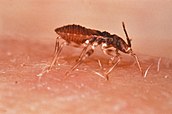Portal:Argentina/Selected article/11
Chagas disease (Portuguese: doença de Chagas, Spanish: enfermedad de Chagas-Mazza, mal de Chagas in both languages; also called American trypanosomiasis) is a tropical parasitic disease caused by the flagellate protozoan Trypanosoma cruzi. T. cruzi is commonly transmitted to humans and other mammals by an insect vector, the blood-sucking insects of the subfamily Triatominae (family Reduviidae) most commonly species belonging to the Triatoma, Rhodnius, and Panstrongylus genera.
The disease may also be spread through blood transfusion and organ transplantation, ingestion of food contaminated with parasites, and from a mother to her fetus. The symptoms of Chagas disease vary over the course of an infection. In the early, acute stage, symptoms are mild and usually produce no more than local swelling at the site of infection. After 4–8 weeks, individuals with active infections enter the chronic phase of Chagas disease that is asymptomatic for 60–80% of chronically infected individuals through their lifetime. (Full article...)

